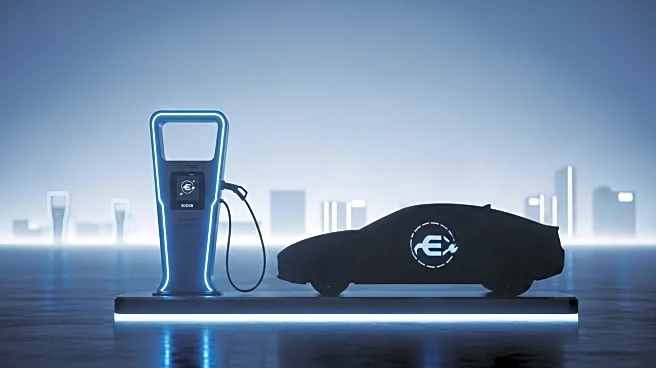What is the story about?
What's Happening?
Rivian Automotive has reported a 32% increase in sales for the third quarter, delivering 13,201 vehicles and producing 10,720. Despite this growth, the company has revised its full-year delivery guidance downward to a range of 41,500 to 43,500 vehicles, a decrease from the previous forecast of 40,000 to 46,000 vehicles. This adjustment comes as Rivian prepares to announce its third-quarter results on November 4, where analysts expect a loss of 73 cents per share, an improvement from the 97 cents loss in the same period last year. Sales are anticipated to rise by 70.8% to $1.492 billion. The company's stock has seen a decline of 13.11% over the past five days, reflecting market concerns over the revised forecast.
Why It's Important?
The revision of Rivian's delivery guidance is significant as it highlights the challenges faced by the company in scaling production to meet market expectations. While the increase in sales is a positive indicator of demand for Rivian's electric vehicles, the downward adjustment in guidance suggests potential production or supply chain issues. This development impacts investors and stakeholders who are closely monitoring Rivian's ability to compete with established automakers in the rapidly growing EV market. Rivian's performance is crucial as it represents a key player in the transition to sustainable transportation, and its ability to meet delivery targets could influence investor confidence and market dynamics in the EV sector.
What's Next?
Rivian is set to announce its third-quarter financial results on November 4, which will provide further insights into its operational performance and future outlook. Analysts and investors will be keenly observing the company's strategies to address production challenges and improve delivery capabilities. The market will also be watching for any updates on Rivian's upcoming models, such as the R2 SUV, and how these might impact future sales and market share. Additionally, Rivian's stock performance will likely be influenced by its ability to meet revised guidance and demonstrate progress in scaling its operations.
Beyond the Headlines
The revision in Rivian's guidance underscores the broader challenges faced by new entrants in the EV market, particularly in scaling production to meet increasing demand. This situation highlights the importance of robust supply chain management and production efficiency in the automotive industry. Rivian's experience may serve as a case study for other emerging EV manufacturers, emphasizing the need for strategic planning and adaptability in a competitive market. Furthermore, Rivian's performance could influence public perception and consumer confidence in new EV brands, impacting the overall adoption of electric vehicles.

















